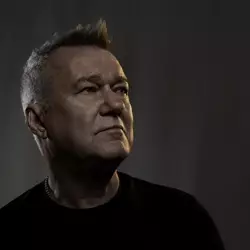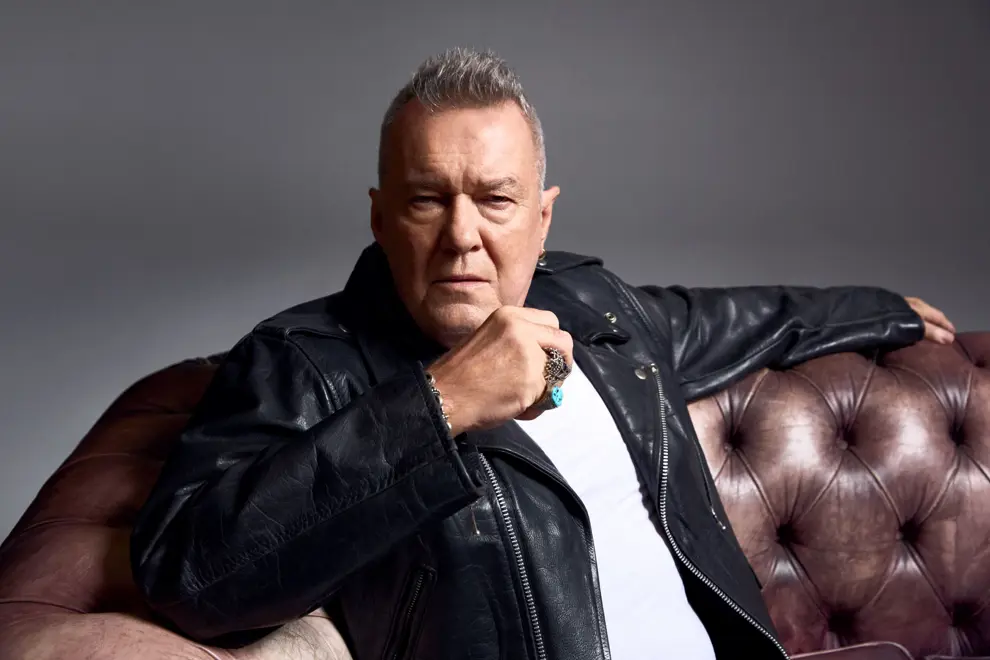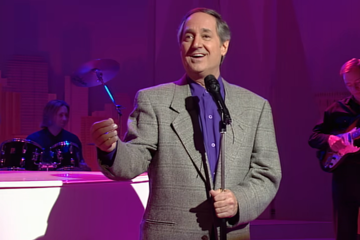 Jimmy Barnes
Jimmy BarnesLike many great stories, this one starts with a joke.
It’s 1984 and following Cold Chisel’s Last Stand, Jimmy Barnes is working on his debut solo album with producer Mark Opitz at Sydney’s Rhinoceros Studios.
The singer calls Michael Gudinski, who has signed him to a solo deal with Mushroom Records. He is buzzing as he invites his record company boss to the studio to hear the new material.
“Michael, Michael,” he exclaims, “Wait till you hear these new songs! It’s a new direction for me, a lot different, but it’s the new music … it’s gonna blow everyone away. It’s the best thing I’ve ever done.”
Unbeknownst to the music mogul, Barnesy and Opitz have recorded a handful of hokey country songs, “horrible country songs,” the producer recalls, “as corny and sappy as we can make them.”
As they play the tape to Gudinski, they can see the colour draining from his face. “What do you think? What do you think?” an excited Barnesy asks. “I’ve spent a lot of time in America, and country music is the new big thing. Rock is dead. This is what I want to do now.”
Don't miss a beat with our FREE daily newsletter
To his credit, Gudinski doesn’t say the songs are great, but nor does he dismiss his artist’s “new direction”. In this moment, Barnesy realises that Gudinski is going to back him, no matter what.
The singer hands Gudinski the cassette. It’s labelled “Jim’s Barn Band”.
“I then realised I’d been had,” the record company boss laughed when he retold the story more than three decades later.
The fun in the studio masked the singer’s apprehension. As Opitz notes, music is littered with the carcasses of singers who leave big bands to embark on a solo career.
“To be honest, when I left Cold Chisel, I was absolutely terrified,” admits Barnesy, who was just 27 when the band split. “The only thought I had was I didn’t want to wait around too long to allow people to draw the comparison. I wanted to get out and do what I did best – sing rock ’n’ roll and play in front of people.”
He was nervous but defiant. With the opening chords of No Second Prize ringing in his ears, he thought, “I refuse to lie down. Fuck Cold Chisel. Fuck the music industry. If I’m going down, I’m going down fighting.”
Barnesy had actually written No Second Prize in Chisel’s dying days. But the band didn’t want to record it. “It was one of the reasons I left,” he reveals.
“I thought I’d save it for a rainy day. Not long after, Cold Chisel broke up, so it didn’t get any more rainy than that.”
Barnesy describes No Second Prize as “a song of hope”.
“It’s always meant a lot to me because it’s the way I feel – you’ve just got to get out there and do your best. It’s not about winning or losing, it’s about having a go. If you’re tenacious enough and you hit ’em hard enough, something’s gonna stick.”
“In that one statement, you have the story of Jimmy’s entire career – and his life,” Gudinski later reflected. “The guy never gives up.”
Opitz suggested calling the album “Extensions”.
“Oh, I like that,” Barnesy responded. “Meaning this is an extension of me after Cold Chisel?”
“No,” the producer quipped, “It means that we can pay for the extensions to your house.”
Barnesy’s debut ended up being called Bodyswerve, a soccer term for dodging or avoiding an opponent. It was released in September 1984, just five months after Chisel’s farewell studio album. Dispelling Barnesy’s doubts, it soared to number one.
Along with No Second Prize, the album featured another smash hit, Daylight, which, like No Second Prize, reached number 12 on the national charts.
Cold Chisel had previously demoed Daylight for the Circus Animals album.
With Bodyswerve sitting pretty on top of the Australian charts, Gudinski turned his attention to his big dream – breaking Barnesy in the US.
“All I fucking want, Jimmy, is for you and me to get to number one in the States,” Barnesy recounted the conversation in his best-selling memoir Working Class Man. “That’s all I want. Well, that and St Kilda to win the premiership. Come to think of it, there’s a few other fucking things too, but that will do for starters.”
Gudinski organised a deal with Geffen Records, with Barnesy signed by the legendary A&R man Gary Gersh (who would later sign Nirvana and Sonic Youth).
Gersh gave Barnesy a song he wanted him to record. The only problem was that the singer didn’t like it. “I thought it was pretty mediocre,” was Barnesy’s assessment of American Heartbeat. “One of my least-favourite songs of all time.”
“Trust me,” Gersh said. “I really want you to consider this song because I think you’ll work well with this guy.”
Gersh was right. Barnesy met with the song’s writer, Jonathan Cain, the keyboard player in Journey, who co-wrote their classic Don’t Stop Believin’, and was a former member of The Babys, who had Top 10 hits in Australia at the end of the ’70s with Isn’t It Time and Every Time I Think Of You.
After meeting with Barnesy, Cain wrote a song that would change the singer’s life.
“Jonathan’s impression after meeting me and listening to my record was that my audience was working-class, honest and straightforward. Real people who worked hard and on a Saturday night wanted to kick their heels up and have a good time, and my job was to make every night Saturday night for them. And he hit the nail right on the head.
“Soon after, he rang me up and said, ‘I’ve got a song for you.’ I went back to see him, and he played me Working Class Man.
“From the moment I heard it, I knew it was great. I recorded it, but I had to go back to Australia to do a Tasmanian tour. Jonathan mixed the song and sent it to me. From the minute I heard the mix, I thought, ‘This is gonna become a classic.’
“It means a lot to me. Most people thought it was written about me, but it was actually written about my audience – staunch, honest people, who work and who care. I perform it as a tribute to them.”
Jimmy Barnes was obviously a priority for Geffen Records. As the late-great Michael Gudinski noted, “I’m not sure if any Australian album has featured so many international stars.”
The players on the record included Mick Fleetwood, Jonathan Cain, Little Feat’s Billy Payne and Kenny Gradney, Waddy Wachtel, Charlie Sexton (Bob Dylan’s band), Billy Burnette (Fleetwood Mac), Tommy Thayer (KISS), Dave Amato (REO Speedwagon), Randy Jackson (American Idol, Journey), Tony Braunagel (Back Street Crawler and Bonnie Raitt) and Tony Brock (The Babys), with Kim Carnes on backing vocals.
And Gary Gersh put the feelers out to his contacts to source songs for the album. Steven Van Zandt, the guitarist in Bruce Springsteen’s E Street Band, came back with a song he wrote with Steve Jordan (who is now the drummer in The Rolling Stones).
“Steven and Steve Jordan had written this song specifically for me,” Barnesy recalls, smiling. “It was a little demo that he’d recorded on a Dictaphone. There was nothing else on it, just Steven scatting and someone beating on Little Steven’s couch – I think it was Steve Jordan, one of the best drummers in the world.”
The singer instantly loved it. “It was just the perfect demo. I put it in the right key for me, and I did it.”
Barnesy didn’t get to meet Little Steven until nearly 30 years later. “Being a fan of the E Street Band, I always wondered how he would have approached the song.”
Barnesy ended up doing a new version of Ride The Night Away for his 30:30 Hindsight album, celebrating his three decades as a solo artist. “Steven came to my house. My son [Jackie] played drums, and I got Steven playing the guitar solo and singing harmonies. Virtually, it was take three, but we spent about 12 hours together, just talking, with Steven telling stories about The Sopranos.
“The way I played it [originally] was big and rocky. It’s a classic Keith Richards quote – anyone can rock, but the art is rolling. Steven brought this rolling thing to it. He made it swagger and move, the way he envisaged the song when he first wrote it. He breathed some life into the song, which was there; it just needed to be resuscitated.”
Gersh also introduced Barnesy to a songwriter named Chas Sandford, who had co-written John Waite’s classic Missing You.
When Barnesy and Sandford got together to write, the American played a song he’d written, but immediately said, “Don Henley wants this one, but I’m saving it for my solo record.”
Barnesy, with a little help from Gary Gersh, eventually convinced Sandford to part with the song, and I’d Die To Be With You Tonight – featuring Kim Carnes on backing vocals – became Barnesy’s first Top 10 solo single. “It was a big song for me, one of the pivotal songs of my career.”
Gersh also hooked Barnesy up with Tom Kelly and Billy Steinberg, who had just written Like A Virgin for Madonna (and would later write I Touch Myself with Chrissy Amphlett and Mark McEntee).
They worked on some rock songs that Barnesy had started writing in Germany. Steinberg and Kelly demoed the tracks, giving Barnesy a cassette. “My tough rock songs now sounded like German cabaret songs sung by a cantor, with the slightest hint of Madonna thrown in for good measure,” he laughs. “I never played them again.”
As Michael Gudinski observed, the experience of making For The Working Class Man taught Barnesy “what he wanted to do and, more importantly, what he didn’t want to do”.
For the album, Barnesy also reworked seven songs from Bodyswerve, including No Second Prize, Daylight and another song that Chisel had demoed, Promise Me You’ll Call. The tracks were remixed by Bob Clearmountain, who got Barnesy to re-record the vocals.
The legendary hit-maker was impressed by the singer’s efficiency. “I just finished an album with David Bowie, and he took a month to sing one song,” Clearmountain confided. “You just did four in a night, that’s unbelievable.”
Geffen placed Working Class Man in Ron Howard’s 1986 movie Gung Ho, starring Michael Keaton, about a Japanese corporation taking over the American auto industry.
Ron Howard made the American video for Working Class Man. “And we travelled around doing some promo,” Barnesy recalls. “It was very funny seeing the effect he had on people in America. He’s like Vegemite in America, because he’s been on TV since he was like six years old. He was a really great guy to hang out with.”
Despite the big-screen exposure, Working Class Man did not become a big hit in the US, peaking at 74.
But the song became a Top 20 hit on the US Country charts for Lacy J. Dalton. “She did a great version, but it’s got a real twang,” Barnesy smiles. “I can’t listen to it, because every time I did, I’d start singing the song like that, with a real twang.”
Working Class Man became Barnesy’s signature song and an unofficial national anthem. Indeed, Spicks and Specks host Adam Hills turned Working Class Man into a new version of the Australian national anthem, releasing Working Class Anthem in 2004.
Mushroom Records released For The Working Class Man on double vinyl in December 1985. Even though it would have fitted on a single disc, the record company wanted the extra space in the grooves for a superior sound.
Gudinski planned to sell the album for $13.99, “but Jimmy wanted his fans who’d bought the Bodyswerve album to get the new tracks at a reasonable price”. He insisted that the double album retail for $10.99.
“The album was Jimmy’s gift to his fans,” Gudinski said. “A record for everyone who’s believed in him … For The Working Class Man.”
“For The Working Class Man was a big, big step for me,” Barnesy reflects. “Bodyswerve was a raw, rough record; just get in the studio and keep your head down and try and not make mistakes, working with people I was familiar with. Then, suddenly, I was signed to Geffen Records in America, and having people throwing money at me, left, right and centre.”
The album defined Barnesy’s solo career. As the authors of The 100 Best Australian Albums declared, “It defined both him and much of Australia.”
It sold more than 500,000 copies, spending seven weeks at number one – Barnesy’s longest-running chart-topper.
To celebrate For The Working Class Man, Jimmy Barnes is hitting the road for the Working Class Man 40th Anniversary Tour, a tour co-presented by Michael Gudinski’s son, Matt. And the Mushroom Group is releasing a special 40th anniversary edition of the album – on CD, cassette and double vinyl (out November 14).
Back in 1986, the American record company planned to release the album as A Week Away From Paradise, a line from the closing cut, Paradise, which Barnesy had written after an all-nighter recording with Cold Chisel, “rattling from copious amounts of speed, coke and vodka, every cell in my body vibrating, and I wanted to write a song about it”.
Barnesy wrote another song, Boys Cry Out For War, after reading Lord Of The Flies. “It was about society breaking down and violence taking over. I could relate to that easily enough.
“I was angry and wanted a guitar riff that showed how angry I was. I had spent years fighting with Cold Chisel, pushing them to play louder. Now I had a chance to play as fast and as loud as I wanted.”
The American version of For The Working Class Man ended up being self-titled.
Michael Gudinski’s dream of conquering the US with Barnesy didn’t come true. But they gave it a red-hot go. In 2017, four years before his passing, Gudinski reflected on their journey, noting: “I’ve been thinking about that country album, Jimmy. It’s actually not a bad idea.”
Despite being pitched at the American market, the Jimmy Barnes album stalled at number 109 in the US, spending four months in the Billboard 200.
“In the end, the album was too Australian,” Barnesy believes. “We hadn’t changed it enough to make it suit the US market.
“But what we had done was kick my career in Australia into the next gear.”
And now the Working Class Man is turning 40 but showing no signs of a mid-life crisis, even popping up in triple j’s Hottest 100 of Australian Songs. Sure, he might have mellowed a bit – the vodkas flow a little more slowly – but he still works hard and loves to have a good time at the end of the working week.
He’s a simple man, with a heart of gold, in a complicated land. And he can still tell a hell of a story. Did I mention that during the making of the album, Eddie Van Halen called and wanted to know if Barnesy would be interested in becoming Van Halen’s new singer?
“Ah, yeah, let me tell you all about it,” For The Working Class Man starts.
It’s one of the greatest stories in Australian rock.
JIMMY BARNES
WORKING CLASS MAN 40th ANNIVERSARY TOUR
WITH SPECIAL GUESTS ICEHOUSE, IAN MOSS & KATE CEBERANO
Tickets and more details: MG Live
Saturday 22 November - Mount Duneed Estate | Geelong, VIC
Saturday 29 November - Sirromet Wines | Mount Cotton, QLD
Saturday 6 December - Bimbadgen | Hunter Valley, NSW
Saturday 17 January - The Regatta Grounds | Hobart, TAS
Saturday 31 January - Peter Lehmann Wines | Barossa Valley, SA
Saturday 7 February - Sandalford Wines | Swan Valley, WA
















